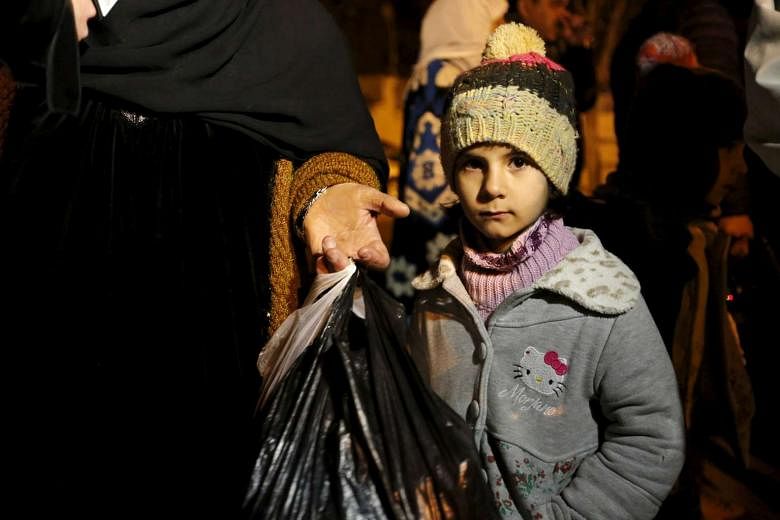BEIRUT (AFP) - At least 16 more people have died of starvation in the besieged Syrian town of Madaya since an aid convoy entered earlier this month, according to Doctors Without Borders (MSF).
Several dozen more residents of the town are in "danger of death" because of severe malnutrition, the humanitarian group warned.
The latest deaths were reported as the Syrian Red Crescent told AFP it had gained rare access on Saturday (Jan 30) to Madaya and two other besieged towns to assess humanitarian needs.
MSF said the additional deaths in Madaya brought to 46 the number of people reported to have died of starvation in the town since December.
It said real toll could be worse.
"The real number is almost certainly higher, as MSF is aware of reports of people dying of starvation in their homes."
Located in Damascus province, Madaya is under government siege, and its fate has been one of the sticking points for fresh peace talks on the Syrian conflict that opened on Friday in Geneva after delays.
Syria's opposition wants to see the implementation of UN Security Council resolutions demanding an end to sieges before committing to new negotiations.
Madaya is one of four towns included in a rare deal last year that was intended to halt fighting and allow the entry of humanitarian aid.
But despite the deal, the UN and other aid groups have had only limited access to Madaya, along with rebel-held Zabadani, and the government-held towns of Fuaa and Kafraya, which are under opposition siege.
Conditions in Madaya have reportedly been among the worst, with about 42,000 civilians there surrounded by government troops who have laid mines around the town to prevent people leaving.
While the government has some ability to airdrop supplies to Fuaa and Kafraya, the opposition has no similar capacity.
Aid groups have regularly urged continuous aid access to all four towns, as well as the evacuation of those with malnutrition or other illnesses.
Citing medics it supports in the town, MSF said there were at least 320 cases of malnutrition in Madaya, including 33 that were so severe that the individuals could die without prompt treatment.
"It is totally unacceptable that people continue to die from starvation, and that critical medical cases remain in the town when they should have been evacuated weeks ago," said MSF's director of operations Brice de le Vingne.
"The warring parties responsible for these besiegement strategies need to allow unhindered medical and humanitarian access immediately," he added.
After the September deal for the four towns, an initial aid delivery was made, but no subsequent assistance was allowed in until Jan 11, after reports of deaths in Madaya.
Additional convoys of food and medicine entered Madaya, Fuaa and Kafraya on Jan 14, and then all four towns on Jan 19. On Saturday, the Syrian Red Crescent's operations chief Tamam Mehrez told AFP it had been able to enter Madaya, Fuaa and Kafraya to carry out humanitarian assessments.
"Our teams today entered Madaya in Damascus province, and Kafraya and Fuaa in Idlib province, as part of periodic access to check on the sick and review critical situations," he said.
He said he could not provide further details until the visits were finished, but added that the teams were not delivering aid.
The UN estimates around 486,700 Syrians are living under sieges imposed by the regime, rebels or the Islamic State in Iraq and Syria (ISIS) group.
The UN's aid chief said this week that 75 per cent of its requests for aid deliveries in Syria went unanswered by the government.
Stephen O'Brien told the UN Security Council that access to hard-to-reach areas was "simply not happening" and that the Syrian government had yet to give approval to most planned relief convoys.

